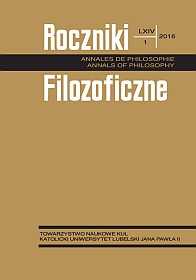Thomas Hobbes as Interpreted by Leslie Stephen and British Agnosticism at the Turn of the 19th and the 20th Centuries
Abstract
Leslie Stephen, one of the main representatives of Victorian agnosticism and an important Victorian historiographer, devoted much space in his works to the philosophy of Thomas Hobbes, interpreted by Stephen as a confirmed sceptic; Hobbes’ thought partially inspired Stephen’s own philosophy—especially when it comes to such problems as the role of religion and the nature of faith. An analysis of Stephen’s comparison of Hobbes to Herbert Spencer shows an analogy between two accounts of the problem of the knowledge of God: (1) that of Hobbes and Henry Longueville Mansel, a fideist, and (2) that of Herbert Spencer, an agnostic. The analysis sheds light on the modern inspirations of Victorian agnosticism and its influence on Victorian historiography.
References
[Anon.] „The Theory of Belief: Dr. Newman and Mr. Leslie Stephen”. The Contemporary Review, 31 (1877): 869–873.
Aubrey, John. „Thomas Hobbes (1588-1679)”. W: ‘Brief Lives,’ chiefly of Contemporaries, set down by John Aubrey, between the Years 1669 & 1696, red. Andrew Clark, vol. 1, 321–395. Oxford: Clarendon Press, 1898.
Bicknell, John W. „Leslie Stephen’s English Thought in the Eighteenth Century: A Tract for the Times. Victorian Studies 6 (1962), 2: 103–120.
Curley, Edwin. „‘I Durst Not Write So Boldly’”. W: Hobbes e Spinoza. Scienza e politica, red. Daniela Bostrenghi, 497–593. Napoli: Bibliopolis, 1992.
Descartes, René. Medytacje o pierwszej filozofii, przeł. Maria Ajdukiewicz, Kazimierz Ajdukiewicz, Stefan Swieżawski, Izydora Dąmbska. Kęty: Wydawnictwo Antyk, 2001.
Gorham, Geoffrey. „The Theological Foundation of Hobbesian Physics: A Defence of Corporeal God”. British Journal for the History of Philosophy 21 (2013), 2: 240-261. DOI: 10.1080/ 09608788.2012.692663.
Lightman, Bernard. The Origins of Agnosticism: Victorian Unbelief and the Limits of Knowledge. Baltimore – London: The Johns Hopkins University Press, 1987.
Mansel, Henry Longueville. The Limits of Religious Thought. Boston: Gould and Lincoln, 1860.
Maurice, Frederick Denison. Moral and Metaphysical Philosophy, vol. 2. London – New York: Macmillan and Co., 1890.
The English Works of Thomas Hobbes of Malmesbury, red. William Molesworth. London: John Bohn, vol. 1 – 1839, vol. 3 – 1839, vol. 4 – 1840.
Robertson, George Croom. Hobbes. Edinburgh – London: William Blackwood and Sons, 1905 (data pierwszego wydania: 1886).
Spencer, Herbert. First Principles. London: Watts & Co., 1900.
Springborg, Patricia. „Hobbes’s Challenge to Descartes, Bramhall and Boyle: A Corporeal God”. British Journal for the History of Philosophy 20 (2012), 5: 903-934. DOI: 10.1080/09608788. 2012.718606.
Stephen, James Fitzjames. Horae Sabbaticae. London – New York: Macmillan and Co., 1892.
Stephen, Leslie. An Agnostic’s Apology and Other Essays. New York – London: G. P. Putnam’s Sons – Smith, Elder & Co., 1903.
Stephen, Leslie. Essays on Freethinking and Plainspeaking. New York – London: G. P. Putnam’s Sons – The Knickerbocker Press, 1905.
Stephen, Leslie. History of English Thought in the Eighteenth Century, vol. 1 i 2. London: Smith, Elder & Co., 1876.
Stephen, Leslie. Hobbes. London: Macmillan and Co., 1928.
Stephen, Leslie. Hours in a Library. London: Smith, Elder & Co., 1881.
Stephen, Leslie. Studies of a Biographer, vol. 1, 3 i 4. London: Smith, Elder and Co. – Duckworth and Co., 1907.
Stephen, Leslie. The Life of Sir James Fitzjames Stephen, Bart., a Judge of the High Court of Justice. London: Smith, Elder & Co., 1895.
Stephen, Leslie. The English Utilitarians. London: Duckworth and Co., vol. 1 – 1912, vol. 2 – 1900.
Tönnies, Ferdinand. Hobbes and Spinoza. W: Tenże. On Social Ideas and Ideologies. New York – Evanston – San Francisco – London: Harper & Row, Publishers, 1974.
Copyright (c) 2016 Roczniki Filozoficzne

This work is licensed under a Creative Commons Attribution-NonCommercial-NoDerivatives 4.0 International License.





